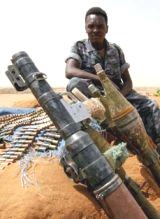Sudan masses troops for decisive strike against Darfur rebels
By Gethin Chamberlain
Oct 21, 2006 (AL-FASHER) — The soldier pushed at the bomb with his foot, rolling it through the dust towards the white Russian-built Antonov aircraft standing on the runway of Al Fasher airport.
 The plane was being loaded for another bombing run, as Sudanese government forces gear up for a military onslaught when Ramadan ends today or tomorrow.
The plane was being loaded for another bombing run, as Sudanese government forces gear up for a military onslaught when Ramadan ends today or tomorrow.
Crude but effective, the Antonovs are back in the air over the villages of Darfur, just as they were during the initial pogroms that killed hundreds of thousands and displaced more than two million. When they reach their targets, the soldiers lower the ramps and kick out the bombs -– which look like munitions used in the Second World War –- to explode on those below.
New arrivals at the El Salaam camp outside Al Fasher, the capital of North Darfur, describe how the Antonovs and helicopter gunships attacked their villages, forcing them to flee.
“I saw about 10 bombs falling,” said Adam Ishag, who fled his village of Hila Babkeir after it came under attack. “They exploded beside the houses and two were destroyed. We took the children and we ran away.”
The troubled western region of Sudan is entering a new and dangerous period. The Darfur Peace Agreement, signed in the Nigerian capital Abuja in May, largely at the urging of the international community, is widely perceived to have failed. Fighting has escalated and the rebel groups, which splintered acrimoniously after the signing, are once again looking to present a united front.
In recent weeks, the Sudanese government has been engaged in a frenetic game of diplomatic brinkmanship, trying to convince the international community that there is no need for a United Nations peacekeeping mission to Darfur, approved by the Security Council in August. Yet despite that, its army and its Arab militia allies, the Janjaweed, are reported to be massing in the north. The rebels, and UN officials, believe that a major attack is imminent.
Planes carrying soldiers have poured into Al Fasher airport, bringing with them vast quantities of weapons. On Wednesday evening, traffic in the centre of town ground to a halt as a military convoy, perhaps 100 vehicles long, rolled by – some packed with men, others with machineguns and rocket launchers.
Both the government and the rebels – many now fighting under the banner of the newly formed National Redemption Front – fear that if the UN does take over from the hopelessly stretched African Union (AU) force, then there will be little chance of seizing more territory. If they have to renegotiate the peace agreement, they intend to do so from a position of strength.
“It is a stand-off with the US and some European governments, including Britain,” said Ghazi Atabani, a Sudanese presidential adviser, in an interview with The Sunday Telegraph last week. His government argues that it is now fighting a legitimate “war on terror” against those who refused to sign up to the peace deal. But Mr Atabani conceded that talks would have to come. “Even if you win the military battle, it is a loss,” he said. “In the end, it will just lead to another rebellion.”
Yet military victory itself is far from certain. UN and AU sources report that the Sudanese army is demoralised and vulnerable. It has suffered two heavy defeats in the past month – including one in which 3,000 troops were reportedly routed in 20 minutes.
Unlike the earlier war in southern Sudan, which pitched mainly Muslim government forces against Christian and animist rebels, Darfur is an almost exclusively Muslim conflict. “It is not a question of religion this time, it is a question of power,” said Mudawi Ibrahim Adam, an aid worker and fierce critic of the government.
The AU has said it does not want to stay on after December 31, when its mandate runs out. And there appears no prospect of a UN force of 22,500 troops arriving before spring.
For those caught in the -middle, life is looking desperate. Aid workers cannot operate effectively; at least a dozen have been killed since the peace deal was signed. The UN Office for the Coordination of Humanitarian Affairs says that 500,000 people are now cut off from aid.
“Life has always been precarious in Darfur,” said a spokesman. “It will never be an easy place to live. But it doesn’t have to be the living hell it is now.”
(Sunday Telegraph)
